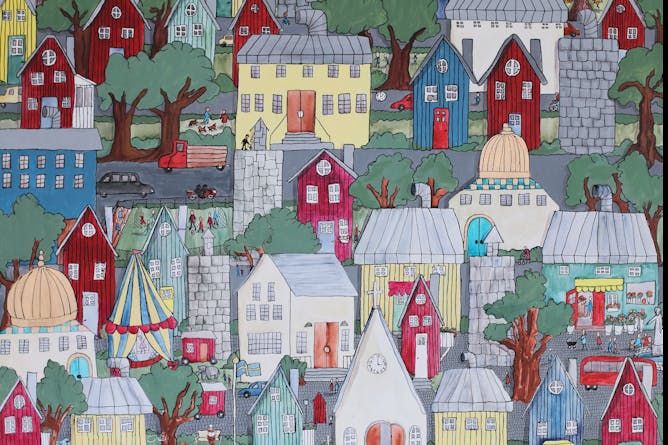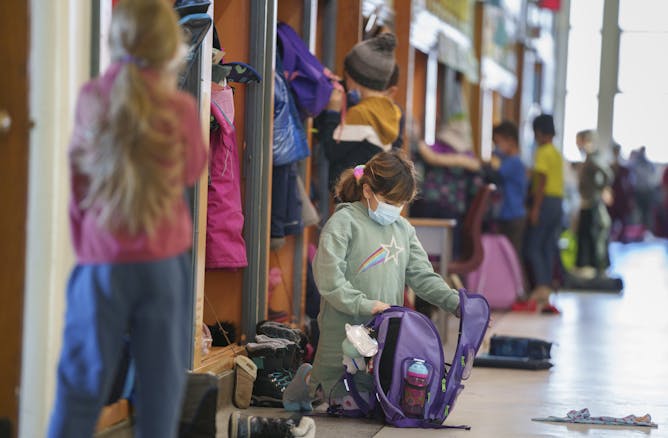|
Just as Schrodinger’s cat was theoretically both alive and dead, it seems we are currently in a pandemic and yet simultaneously out of it. The term “post-pandemic” keeps popping up to describe the present, in which most restrictions are lifted, some provinces have stopped reporting daily COVID-19 data in favour of weekly updates, testing is limited and people are trying to return to a sense of normalcy. At the same time, omicron BA.2 continues to circulate widely, new variants are emerging and case counts remain high.
How are we to navigate Schrodinger’s pandemic?
Today in The Conversation Canada, Dasantila Golemi-Kotra of York University writes about what it means when government leaders ask us to learn to “live with the virus.” Individuals need resources to be comfortable managing current risks, which include BA.2 and new variants, as well as the potential impact of high infection rates on things like absenteeism. “We are not in a position to predict the future of this pandemic, just yet,” she writes.
Also today:
|

|
Patricia Nicholson
Health + Medicine Editor
|
|

Ontario Chief Medical Officer of Health Kieran Moore arrives to speak at a press conference at Queen’s Park on April 11, 2022. Ontario lifted most COVID-19 restrictions in March.
THE CANADIAN PRESS/Nathan Denette
Dasantila Golemi-Kotra, York University, Canada
Instead of minimizing current or future waves of COVID-19, we need for strategies to deal with new variants efficiently. Only then can we live with the virus in a healthy way.
|

This generation finds itself part of a problem it did not create, but it is also part of the solution.
THE CANADIAN PRESS/Nathan Denette
Simon Appolloni, University of Toronto
There are ways to convey the hard scientific facts about climate change and help young generations adapt in the face of adversity and manage change over time.
|

Parents in households that spoke languages other than English expressed concerns over their children’s English-language development.
(Shutterstock)
Emma Chen, University of Saskatchewan
COVID public health measures included school closures and a shift to online learning. This placed immigrant families at a disadvantage as they saw to their children’s emotional and educational needs.
|

European countries have embraced housing co-ops for decades to address housing affordability. Why not Canada?
(Piqsels)
Margaret Kohn, University of Toronto
In a period when homelessness and housing costs have reached crisis levels, it’s time to look at housing co-operatives as a potential game-changer.
|

The screen in Piccadilly Circus is lit to celebrate the 70th anniversary of Queen Elizabeth’s accession to the throne.
(AP Photo/Alberto Pezzali)
Catherine Ellis, Ryerson University
This year’s Platinum Jubilee celebrations will draw on traditions that have bolstered support for monarchs since the early 1800s — it could help this year’s celebrations succeed again.
|
La Conversation Canada
|

Nos cellules contiennent des milliers de protéines différentes, agissant comme des petites machines, afin d’accomplir une grande variété de processus cellulaires.
(Shutterstock)
Dr El Bachir Affar, Université de Montréal; Clémence Messmer, Université de Montréal
Démystification de la manière dont les protéines de nos cellules sont gérées au niveau de leur synthèse et de leur dégradation. Une perturbation de cet équilibre peut être associée au cancer.
|

Des élèves d'une école primaire se préparent à entrer en classe à Montréal en janvier 2022.
LA PRESSE CANADIENNE/Paul Chiasson
Geneviève Sirois, Université TÉLUQ ; Aline Niyubahwe, Université du Québec en Abitibi-Témiscamingue (UQAT)
Les médias font de plus en plus état de la présence d’enseignants non légalement qualifiés dans les écoles québécoises, ce qui inquiète à la fois les parents et les gestionnaires.
|
Ukraine Invasion
|
-
Gabriel da Silva, The University of Melbourne
Claims Russia has used chemical weapons in Ukraine will be difficult if not impossible to verify.
-
Tim Luckhurst, Durham University
Digital technology allows reporters and citizen journalists more freedom than ever to bring fast, accurate information from war zones. There are also a few lies.
-
Stanislav Budnitsky, Indiana University
Political phone pranksters played a big part in the passage of draconian laws that strangle free expression in Russia.
|
|
COVID-19
|
-
Elizabeth Tricomi, Rutgers University - Newark ; Wesley Ameden, Rutgers University - Newark
People tend to dislike uncertainty and risk – two things that are hard to avoid completely during a pandemic. That’s part of why it can feel especially draining to make even small decisions these days.
|
|
Environment + Energy
|
-
Ganesh Marin, University of Arizona; John Koprowski, University of Wyoming
Keeping landscapes connected can help protect wild animals and plants. In the US Southwest, border wall construction is closing off corridors that jaguars and other at-risk species use.
|
|
Science + Tech
|
-
Dana Al-Hindi, University of California, Davis; Brenna Henn, University of California, Davis
The South African Khoe-San communities are no strangers to exploitative research. One research team is trying to provide genetic ancestry results to community members. But they still face many challenges.
|
|
|
|
| |
| |
| |
| |
|
|